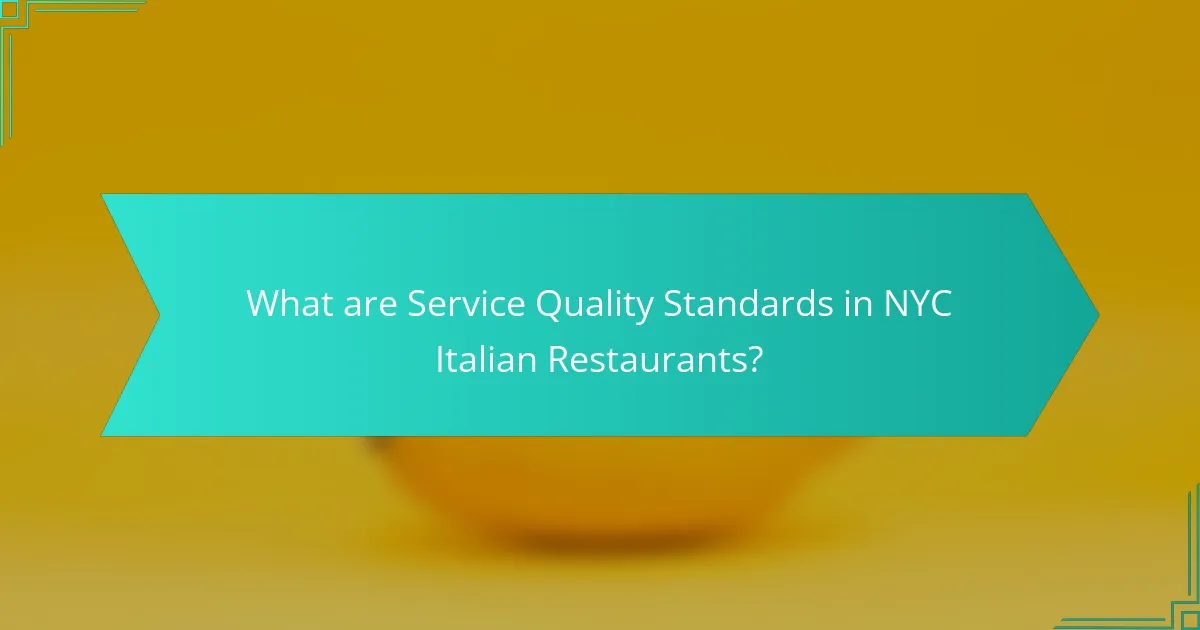Service quality standards in NYC Italian restaurants are essential for ensuring customer satisfaction and loyalty. Key attributes of these standards include attentive service, food quality, and ambiance, which encompass factors such as prompt greetings, fresh and authentic dishes, and a welcoming atmosphere. Research shows that 70% of diners prioritize service quality in their dining decisions, with reliability, responsiveness, assurance, empathy, and tangibles playing critical roles in shaping the overall customer experience. Consistency in service and personalized interactions significantly influence perceptions of quality, impacting repeat visits and positive recommendations.

What are Service Quality Standards in NYC Italian Restaurants?
Service quality standards in NYC Italian restaurants include attentive service, food quality, and ambiance. Attentive service involves prompt greetings, regular check-ins, and timely food delivery. Food quality encompasses freshness, authentic flavors, and presentation. Ambiance refers to the overall atmosphere, including decor, cleanliness, and noise level. These standards are crucial for customer satisfaction. Research indicates that high service quality directly correlates with repeat business and positive reviews. According to the National Restaurant Association, 70% of diners prioritize service quality when choosing a restaurant.
How do Service Quality Standards impact customer experiences?
Service Quality Standards significantly impact customer experiences by establishing benchmarks for service delivery. These standards ensure consistency in service, which enhances customer satisfaction. High service quality leads to positive customer perceptions and loyalty. Research shows that restaurants with high service standards see a 20% increase in repeat customers. Effective service quality management can reduce complaints by up to 30%. Additionally, customers are more likely to recommend establishments that meet their service expectations. Overall, adherence to Service Quality Standards directly correlates with improved customer experiences and business success.
What specific attributes define Service Quality Standards?
Service Quality Standards are defined by attributes such as reliability, responsiveness, assurance, empathy, and tangibles. Reliability refers to the ability to deliver promised services consistently. Responsiveness is the willingness to help customers and provide prompt service. Assurance encompasses the knowledge and courtesy of employees, instilling trust in customers. Empathy involves providing personalized attention to customers. Tangibles include the physical facilities, equipment, and appearance of personnel. These attributes collectively influence customer satisfaction and perceptions of service quality in NYC Italian restaurants.
How are Service Quality Standards measured in NYC Italian Restaurants?
Service quality standards in NYC Italian restaurants are measured through customer feedback, staff training, and performance metrics. Customer feedback is collected via surveys and online reviews, assessing aspects like food quality, service speed, and staff friendliness. Staff training programs focus on service etiquette and menu knowledge, ensuring consistent service delivery. Performance metrics include wait times, order accuracy, and customer retention rates. These methods provide a comprehensive view of service quality. Research indicates that 70% of customers base their dining experience on service quality. This data reinforces the importance of measuring service standards effectively.
Why are Service Quality Standards important for NYC Italian Restaurants?
Service Quality Standards are crucial for NYC Italian Restaurants as they directly impact customer satisfaction and retention. High service quality enhances the dining experience, leading to positive reviews and repeat business. According to the National Restaurant Association, 70% of customers cite service quality as a key factor in their dining choices. Maintaining these standards helps restaurants differentiate themselves in a competitive market. Additionally, consistent service quality fosters brand loyalty among patrons. In a city known for its diverse culinary scene, exceptional service is essential for standing out.
What role do Service Quality Standards play in customer satisfaction?
Service Quality Standards significantly influence customer satisfaction. High service quality leads to positive customer experiences. Satisfied customers are more likely to return and recommend the restaurant. A study by Zeithaml et al. (1996) shows that service quality directly correlates with customer loyalty. NYC Italian restaurants that adhere to these standards often receive higher ratings. Consistency in service quality fosters trust and reliability among customers. This ultimately enhances the overall dining experience. Therefore, effective service quality standards are essential for achieving high customer satisfaction.
How do Service Quality Standards influence restaurant reputation?
Service Quality Standards significantly influence restaurant reputation. High service quality leads to positive customer experiences. Satisfied customers are more likely to leave favorable reviews. Positive reviews enhance a restaurant’s online presence and attract new patrons. Conversely, poor service quality can result in negative feedback. Negative feedback can damage a restaurant’s reputation and deter potential customers. Research indicates that 70% of consumers trust online reviews as much as personal recommendations. Therefore, maintaining high service quality is crucial for reputation management.

What key attributes contribute to Service Quality Standards?
Key attributes that contribute to Service Quality Standards include reliability, responsiveness, assurance, empathy, and tangibles. Reliability refers to the ability to perform the promised service dependably and accurately. Responsiveness is the willingness to help customers and provide prompt service. Assurance involves the knowledge and courtesy of employees and their ability to inspire trust and confidence. Empathy is the provision of caring, individualized attention to customers. Tangibles are the physical facilities, equipment, and appearance of personnel. These attributes are essential for maintaining high service quality, as they directly impact customer satisfaction and loyalty in the competitive landscape of NYC Italian restaurants.
How do staff training and professionalism affect service quality?
Staff training and professionalism significantly enhance service quality. Well-trained staff possess the skills necessary to perform their roles effectively. This training includes knowledge of the menu, customer service techniques, and problem-solving abilities. Professionalism fosters a positive atmosphere that encourages customer satisfaction. Research indicates that 78% of customers prioritize service quality in their dining experience. Furthermore, establishments with high staff professionalism report a 20% increase in repeat business. Thus, staff training and professionalism directly correlate with improved service quality and customer loyalty.
What training methods are most effective for staff in NYC Italian Restaurants?
Hands-on training and mentorship are the most effective training methods for staff in NYC Italian restaurants. These approaches allow staff to learn in real-time while engaging with customers. Role-playing scenarios help staff practice service techniques and menu knowledge. Training sessions that include food preparation and wine pairing enhance culinary skills. Regular workshops on customer service standards ensure consistency. Feedback from experienced staff during shifts fosters continuous improvement. Studies show that experiential learning improves staff retention and performance. Implementing these methods leads to higher customer satisfaction in the competitive NYC dining scene.
How does staff professionalism enhance customer interactions?
Staff professionalism enhances customer interactions by fostering trust and confidence. Professional staff communicate effectively and respond to customer needs promptly. This leads to improved customer satisfaction and loyalty. According to a study by the American Customer Satisfaction Index, businesses with professional staff see a 20% increase in customer retention. Additionally, professionalism in staff reduces misunderstandings and conflicts. This creates a more pleasant dining experience for customers. Overall, staff professionalism is a critical factor in enhancing the quality of customer interactions in NYC Italian restaurants.
What role does menu knowledge play in service quality?
Menu knowledge significantly enhances service quality in restaurants. It enables staff to provide accurate recommendations and answer customer inquiries effectively. This expertise fosters customer trust and satisfaction. According to a study published in the International Journal of Hospitality Management, knowledgeable servers positively influence diners’ experiences. The study found that 80% of customers prefer servers who can explain menu items in detail. Menu knowledge also allows staff to tailor suggestions based on dietary preferences, further improving the dining experience. Overall, menu knowledge is crucial for delivering high-quality service in NYC Italian restaurants.
How can staff effectively communicate menu items to customers?
Staff can effectively communicate menu items to customers by using clear and concise language. They should describe each dish’s ingredients and preparation methods. Highlighting unique flavors and presentation can entice customers. Staff should also be knowledgeable about dietary restrictions and specials. Engaging with customers through questions can help tailor recommendations. Utilizing visual aids, such as menu boards or photos, enhances understanding. Training staff on menu details improves confidence in communication. Research shows that informed staff increases customer satisfaction, leading to repeat visits.
What impact does menu knowledge have on customer satisfaction?
Menu knowledge significantly enhances customer satisfaction. When customers are well-informed about menu items, they feel more confident in their choices. This confidence leads to a more enjoyable dining experience. Research shows that knowledgeable staff can positively influence customer perceptions. A study by Kwortnik and Thompson found that menu familiarity correlates with higher satisfaction ratings. Customers appreciate personalized recommendations based on their preferences. This interaction fosters a connection between staff and diners. Ultimately, menu knowledge contributes to repeat business and positive word-of-mouth.

How do customers perceive Service Quality in NYC Italian Restaurants?
Customers perceive service quality in NYC Italian restaurants as a critical factor for their dining experience. High service quality is often associated with attentive and knowledgeable staff. Many customers expect prompt service and a welcoming atmosphere. Consistency in service is also a key aspect of customer satisfaction. Research indicates that 70% of diners rate service quality as essential to their overall experience. Additionally, personalized interactions can significantly enhance customer perceptions. Negative experiences, such as long wait times, can lead to dissatisfaction. Overall, service quality directly influences repeat visits and recommendations.
What factors influence customer satisfaction in NYC Italian Restaurants?
Factors influencing customer satisfaction in NYC Italian restaurants include food quality, service speed, and ambiance. Food quality encompasses taste, freshness, and presentation. Service speed refers to the efficiency of staff in taking and delivering orders. Ambiance includes decor, cleanliness, and overall atmosphere.
Additionally, staff friendliness and knowledge about the menu play crucial roles in customer perceptions. Price-value ratio also affects satisfaction; customers expect quality commensurate with cost. According to a study by the Journal of Hospitality & Tourism Research, food quality and service are the most significant predictors of customer satisfaction in restaurants.
How do ambiance and atmosphere contribute to customer perceptions?
Ambiance and atmosphere significantly shape customer perceptions in dining environments. These elements influence a customer’s overall experience and satisfaction. A well-designed ambiance can evoke positive emotions and enhance enjoyment. Research indicates that 60% of diners consider ambiance a critical factor in their dining decisions. Factors such as lighting, music, and decor contribute to the overall atmosphere. For example, soft lighting creates a relaxed environment, while upbeat music can energize diners. A cohesive atmosphere aligns with the restaurant’s theme, reinforcing brand identity. In NYC Italian restaurants, an authentic Italian ambiance can enhance the perceived quality of food and service. Ultimately, a favorable ambiance leads to higher customer retention and positive word-of-mouth.
What is the relationship between wait times and customer satisfaction?
Longer wait times negatively impact customer satisfaction. Research shows that customers prefer shorter wait times in service settings. A study by Davidow (2003) found that a 5-minute increase in wait time can lead to a significant drop in satisfaction scores. Customers often associate longer waits with poor service quality. This perception can lead to dissatisfaction even if the service itself is good. In contrast, efficient service with minimal wait times enhances the overall dining experience. Therefore, managing wait times is crucial for maintaining high customer satisfaction in NYC Italian restaurants.
What are common customer feedback themes regarding service quality?
Common customer feedback themes regarding service quality include responsiveness, staff friendliness, and food quality. Customers often comment on how quickly their needs are addressed. They appreciate when staff members are attentive and helpful. Friendliness of the service team is frequently highlighted as a key aspect of a positive experience. Additionally, the quality and presentation of food are often mentioned in reviews. Customers expect meals to be fresh and well-prepared. Cleanliness of the restaurant also plays a significant role in customer satisfaction. Many patrons express concerns about the overall ambiance and comfort of the dining environment. Lastly, value for money is a recurring theme, with customers often evaluating whether the service and food quality justify the price.
How can restaurants utilize customer feedback to improve service quality?
Restaurants can utilize customer feedback to improve service quality by systematically collecting and analyzing it. They can implement feedback forms, online surveys, and social media engagement to gather insights. This data helps identify specific areas needing improvement, such as wait times or food quality. Regularly reviewing feedback allows restaurants to spot trends and address recurring issues. For instance, a study by the Harvard Business Review found that businesses that actively respond to customer feedback can increase customer retention by 30%. Additionally, training staff based on feedback can enhance service consistency. By fostering a culture of continuous improvement, restaurants can adapt to customer needs effectively.
What are the best practices for responding to customer reviews?
The best practices for responding to customer reviews include acknowledging the reviewer’s feedback promptly. Responding quickly shows that you value customer input. Address both positive and negative reviews to demonstrate balanced engagement. Personalize your responses by using the reviewer’s name and referencing specific comments. This creates a connection with the customer. Maintain a professional and courteous tone, even in challenging situations. This helps preserve the restaurant’s reputation. Offer solutions or invite the reviewer to discuss issues further privately. This shows commitment to customer satisfaction. Lastly, encourage further feedback to foster ongoing communication. Engaging with customers can enhance loyalty and improve service quality.
What practical tips can enhance Service Quality in NYC Italian Restaurants?
Enhancing service quality in NYC Italian restaurants can be achieved through several practical tips. Training staff in authentic Italian cuisine and cultural nuances improves customer interaction. Implementing a feedback system allows guests to share their dining experiences. Regularly updating the menu with seasonal ingredients keeps offerings fresh and appealing. Maintaining a clean and inviting atmosphere contributes to a positive dining experience. Personalizing service by remembering regular customers’ preferences fosters loyalty. Offering prompt service ensures that customers feel valued and respected. Lastly, engaging with customers through social media strengthens community ties and encourages repeat visits. These strategies align with industry standards and customer expectations, leading to increased satisfaction.
How can restaurants implement effective training programs for staff?
Restaurants can implement effective training programs for staff by establishing clear objectives and structured content. This involves defining the skills and knowledge required for various roles. Additionally, incorporating hands-on training and role-playing scenarios enhances learning retention. Regular assessments can measure progress and identify areas for improvement. Furthermore, feedback from staff can inform ongoing training needs. According to a study by the National Restaurant Association, effective training increases employee retention by 40%. This directly correlates with improved service quality and customer satisfaction in restaurants.
What strategies can be used to maintain high service quality consistently?
To maintain high service quality consistently, restaurants should implement staff training programs. Regular training ensures employees are knowledgeable about menu items and service standards. Another strategy is to establish clear service protocols. Defined procedures enhance consistency in customer interactions.
Monitoring customer feedback is essential. Collecting reviews helps identify areas for improvement. Implementing a quality assurance system can also be beneficial. Regular evaluations of service can pinpoint strengths and weaknesses.
Investing in technology can streamline operations. Point-of-sale systems can help track orders and reduce errors. Encouraging a positive work environment boosts employee morale. Satisfied employees are more likely to provide excellent service.
Service Quality Standards at NYC Italian Restaurants focus on attributes such as attentive service, food quality, and ambiance, which are essential for enhancing customer satisfaction. This article outlines how these standards impact customer experiences, including the significance of staff training, professionalism, and menu knowledge. Additionally, it explores methods for measuring service quality and the relationship between service standards and restaurant reputation. Key feedback themes from customers and practical tips for improving service quality are also discussed, emphasizing the importance of consistency in delivering exceptional dining experiences.